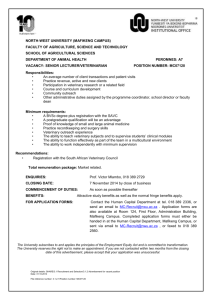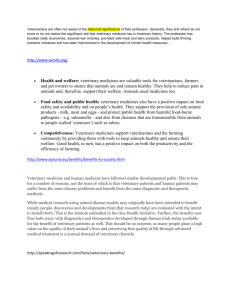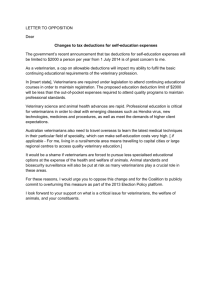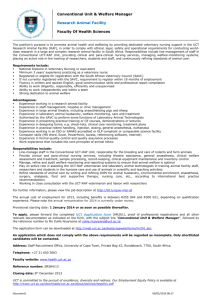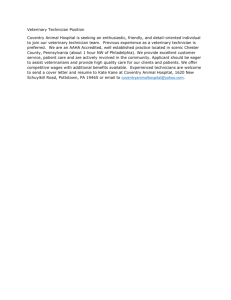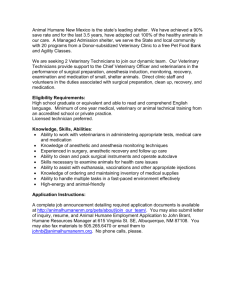SOUTH AFRICAN VETERINARY COUNCIL: PROPOSED POLICY
advertisement
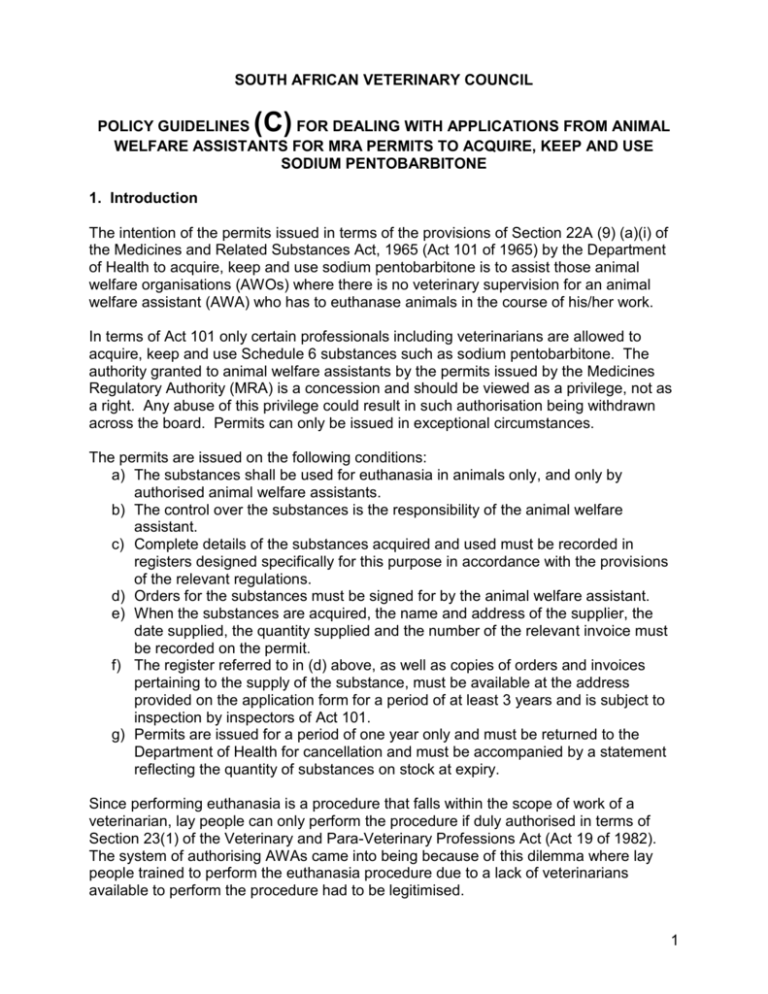
SOUTH AFRICAN VETERINARY COUNCIL (C) POLICY GUIDELINES FOR DEALING WITH APPLICATIONS FROM ANIMAL WELFARE ASSISTANTS FOR MRA PERMITS TO ACQUIRE, KEEP AND USE SODIUM PENTOBARBITONE 1. Introduction The intention of the permits issued in terms of the provisions of Section 22A (9) (a)(i) of the Medicines and Related Substances Act, 1965 (Act 101 of 1965) by the Department of Health to acquire, keep and use sodium pentobarbitone is to assist those animal welfare organisations (AWOs) where there is no veterinary supervision for an animal welfare assistant (AWA) who has to euthanase animals in the course of his/her work. In terms of Act 101 only certain professionals including veterinarians are allowed to acquire, keep and use Schedule 6 substances such as sodium pentobarbitone. The authority granted to animal welfare assistants by the permits issued by the Medicines Regulatory Authority (MRA) is a concession and should be viewed as a privilege, not as a right. Any abuse of this privilege could result in such authorisation being withdrawn across the board. Permits can only be issued in exceptional circumstances. The permits are issued on the following conditions: a) The substances shall be used for euthanasia in animals only, and only by authorised animal welfare assistants. b) The control over the substances is the responsibility of the animal welfare assistant. c) Complete details of the substances acquired and used must be recorded in registers designed specifically for this purpose in accordance with the provisions of the relevant regulations. d) Orders for the substances must be signed for by the animal welfare assistant. e) When the substances are acquired, the name and address of the supplier, the date supplied, the quantity supplied and the number of the relevant invoice must be recorded on the permit. f) The register referred to in (d) above, as well as copies of orders and invoices pertaining to the supply of the substance, must be available at the address provided on the application form for a period of at least 3 years and is subject to inspection by inspectors of Act 101. g) Permits are issued for a period of one year only and must be returned to the Department of Health for cancellation and must be accompanied by a statement reflecting the quantity of substances on stock at expiry. Since performing euthanasia is a procedure that falls within the scope of work of a veterinarian, lay people can only perform the procedure if duly authorised in terms of Section 23(1) of the Veterinary and Para-Veterinary Professions Act (Act 19 of 1982). The system of authorising AWAs came into being because of this dilemma where lay people trained to perform the euthanasia procedure due to a lack of veterinarians available to perform the procedure had to be legitimised. 1 By mutual agreement between the MRA and SAVC, the MRA grants authorisation to lay persons to acquire, keep and use sodium pentobarbitone subject to approval by the South African Veterinary Council (SAVC). It has come to SAVC’s attention that the MRA has been issuing permits on the strength of AWA authorisation only without obtaining the SAVC’s input on each application. Thus the issuing of permits by the MRA was based on a misunderstanding that the SAVC’s approval for MRA permits was implied for any person authorised as an AWA. The SAVC and MRA have since agreed that all applications are first forwarded to the SAVC for approval as AWA authorisation does not automatically include approval for authorisation to acquire, keep and use sodium pentobarbitone. 2. Policy MRA permits will now be issued subject to a positive recommendation from the SAVC. Applications will be considered by the SAVC based on the following principles: a) Applications should demonstrate a real need for the permit. The onus is on the AWO and AWA to demonstrate the exceptional circumstances that necessitate the permit application. b) Additional proof of competency of the AWA: The AWA must demonstrate an understanding of Act 101 and his/her responsibility in this regard. This should be based on an assessment by an SAVC-accredited assessor provided in writing. The candidate must for example demonstrate an understanding of the different schedules of medicines, who is legally allowed to prescribe and use scheduled medicines and what his / her accountability is in terms of the Medicines and Related Substances Act as well as the Veterinary and Para-Veterinary Professions Act. c) SAVC supports improved cooperation between the public and private veterinary sectors and animal welfare. Private and state veterinarians should be aware of AWAs in their areas that have authorisation to acquire, keep and use sodium pentobarbitone. While applications will not necessarily be subject to approval by local private and state veterinarians, it is considered important that they should be made aware of the need. It is possible that such veterinarians, once made aware of the need may offer to supervise the AWA and thereby obviate the need for a permit application. 3. Requirements Applications should be accompanied by the following: a) A written motivation for the need to acquire, keep and use sodium pentobarbitone without veterinary supervision. This motivation must include evidence that no veterinary supervision is available. Applications from Inspectors of the National Council of SPCAs may be exempted from this requirement on condition that a veterinarian in the employ of the NSPCA supports the application; b) Proof of competency by an SAVC-accredited assessor; 2 c) Proof that local state and private veterinarians have been made aware of the application; and d) Failure to comply with any conditions and requirements may result in future applications being denied. Finalised & approved SAVC, 27 October 2009 3

